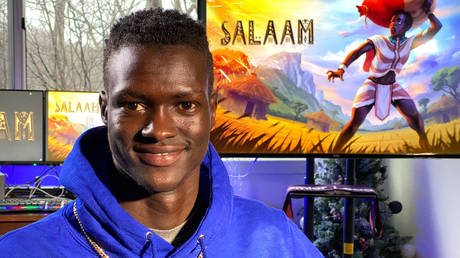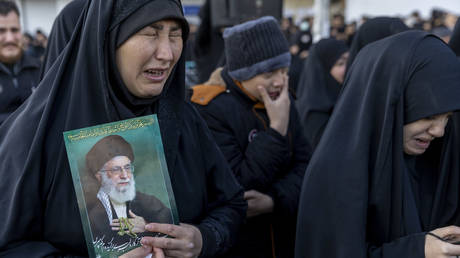
The Davos minds behind the ‘Great Reset’ are now promoting a tear-jerker about an African youth who learned to code and made a game that would help the world’s refugees. Trouble is, his microtransaction gimmick is vaporware.
“This video game lets you step inside the shoes of a refugee,” the WEF tweeted out this week, sharing an article originally authored by Reuters about a refugee from South Sudan and ‘Salaam,’ a video game he supposedly created.
According to the story, Lual Mayen was born during his parents’ flight from South Sudan, and spent the next 22 years in a refugee camp in Uganda before coming to the US. He saw a computer for the first time in the camps, and learned to code with the ambition to “change the world” by creating a game that would let everyone experience the hardships of becoming a refugee.
‘Salaam’ will be free to play, but players will need to make in-app purchases of food, water or medication for their virtual characters – and a portion of that will then go to real-life refugees, Mayen told Reuters.
Microtransactions have been a very controversial feature of modern games, and neither Mayen nor Reuters explained how ‘Salaam’ is supposed to actually deliver the money. Many of the responses to the WEF tweet were skeptical of the concept, to say the least.
The Reuters story said Mayen’s game “went viral after he uploaded it to Facebook and caught the attention of the gaming industry,” to the point he was named a Global Gaming Citizen at the Game Awards in 2018.
However, the story was actually published in February 2020. A check of the Junub Games website, which produces ‘Salaam,’ on Tuesday still showed the game as “coming soon.” The rest of the page consists of media coverage of Mayen, refugee advocacy, and a job offer for “top game developers to help us finish Salaam.”
It remains puzzling why the WEF might be re-upping a February 2020 story about yet-nonexistent vaporware. Last month, the organization tried to promote Swedish activist Greta Thunberg’s efforts against man-made “climate change” by pointing to the experience of Venus, of all places. Unless the WEF is arguing that ancient Earth astronauts settled the second planet of the solar system and destroyed its atmosphere somehow, as of now scientists believe Venus became a greenhouse due to volcanic eruptions, however.
The Davos-bases transnational organization has gained notoriety in recent months for the manifesto written by its founder and director Klaus Schwab, called the ‘Great Reset’ and advocating using the Covid-19 pandemic to make sweeping changes in how the world works.
Think your friends would be interested? Share this story!




